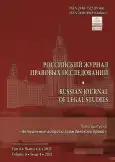The Process of Becoming a Political Personality and the Factors That Determine It (the experience of the German Chancellor Otto von Bismarck)
- Authors: Baev V.G.1, Meshcheryakova S.V.1
-
Affiliations:
- Tambov State Technical University
- Issue: Vol 8, No 4 (2021)
- Pages: 23-32
- Section: Theory and history of state and law
- URL: https://bakhtiniada.ru/2410-7522/article/view/80619
- DOI: https://doi.org/10.17816/RJLS80619
- ID: 80619
Cite item
Abstract
The proposed article attempts to reveal the process of becoming a politician, and not merely an ordinary politician, but one who develops and imposes a large-scale policy that independently determines the options for the development of his country: the creator of the Second Empire in Germany, the great statesman Otto von Bismarck. The goal of the study was to analyze the legal, political, and psychological factors that contributed to the rise of the first civil servant in the empire. The life and fate of each person are in the crosshairs objective and subjective circumstances interact. The role of external, otherworldly forces, colloquially called chance, is also not to be excluded in any such rise. Contrary to popular belief, people are not born clean slates at all. Instead, each bears the stamp of parental education and the personality and health imposed by the genetics of distant ancestors. From the enormous variety of factors, experiences, and relationships within which a personality is formed, the authors of this study chose reference points that, in their opinion, contributed most to forming the contours (or images) of Bismarck as an outstanding politician. These include the aspects of his character that absorbed and reflected the influence of his ancestors and parents (most of all, his mother), as well as the principles that prevailed in the German educational system and the public service of Germany. In this objective review, the subjective (personal) properties of the applicant for the highest administrative position in the state were acutely manifested: a hypermotivation to acquire power and the ability to recognize the importance of representing state interests for themselves.
In their conclusions, the authors relied on collections of Bismarck’s letters, on his parliamentary and political speeches, and other documents that “accompanied” his life. They also relied upon their own interpretation of the distant events of Bismarck’s life and times. The study thus acquired an intersectoral character. Although the historical subtext of our research is obvious, the proposed material will also be of interest to modern politicians.
Keywords
Full Text
##article.viewOnOriginalSite##About the authors
Valery G. Baev
Tambov State Technical University
Email: vgbaev@gmail.com
doctor of law, professor
Russian Federation, TambovSvetlana V. Meshcheryakova
Tambov State Technical University
Author for correspondence.
Email: svetlana.meshcher@yandex.ru
candidate of psychological sciences, associate professor
Russian Federation, TambovReferences
- Steinberg J. Bismark. Biografia. Per. s angl. I. Lobanov. Moscow: AST Publishers, 2014. 736 p. (In Russ.).
- Bismarck O, Bismarck H, Kohl H. Fürst Bismarcks Briefean seine Braut und Gattin. Stuttgart und Berlin, 1914. 600 s.
- Gall L. Bismarck. Der weiße Revolutionär. 2. Aufl. Berlin: Ullstein, 2002. 928 s.
- Bismarck O, Kohl H. Bismarckbriefe 1836-1873. Bielefeld und Leipzig: Velhagen Klassing, 1900. 485 s.
- Fürst und Fürstin Bismarck. Erinnerungenaus den Jahren 1846-1872 von Robert von Keudell. Berlin-Stuttgart, 1901. 500 s.
- Bismarck O. Fürst Bismarck's gesammelte Reden. Band I. Berlin: Globus Verlag, 1894. 400 s.
- Kohl H. Bismarck-Jahrbuch. Dritter Band. Berlin: Verlag D. Häring, 1896. 590 s.
- Bokov UA. Zarozhdenie izbiratelnikh prav prussakov (19 noyabrya 1808 goda – 30 maya 1849 goda). Vestnik Volgogradskogo gosudarstvennogo universiteta. Ser. 5. Yurisprud. 2012;2(17):99–105. (In Russ.).
- Marks K, Engels F. Sochineniya. 2 izd. Т. 4. Мoscow: Politizdat, 1955. 615 p. (In Russ.).
- Briefwechsel des Generals Leopold von Gerlach mit dem bundestags-gesandten by Gerlach, Ludwig Friedrich Leopold von, 1790-1861. [from old catalog]; Bismarck, Otto, Fürst von, 1815-1898. Berlin: Verlag von W. Hertz, 1893. 365 s.
- Tolstoj LN. Otets Sergij. Мoscow: Mir knigi, Minsk: Literatura, 2010. P. 440–446. (In Russ.).
- Radkau Joakhim. Epokha nervoznosti. Germania ot Bismarka do Gitlera. Per. s nem. N. Shtil’mark. Мoscow: Izd. dom Visshei shkoli ekonomiki, 2017. 552 p. (In Russ.).
- Medvedeva МК. Kogda intellectual stanovitsya kollaboratsionistom: Jak Benua-Meshen i ego "istoriya germanskoj armii". Novaya i novejshaya istoriya. 2021;(3):130–137. (In Russ.).
- Mizes Ludwig. Teoria i istoria: interpretatsiya sotsial’no-economicheskoi istorii. Per. s angl.: AV Kuryaev. Мoscow; Chelyabinsk: Sotsium, 2013. 366 p. (In Russ.).
- Dennet Deniel. Opasnaya idea Darvina: evolyutsia i smisl zhizni. Per. s angl. М Semikolennikx. Мoscow: Novoe literaturnoe obozrenie, 2020. 784 p. (In Russ.).
Supplementary files







